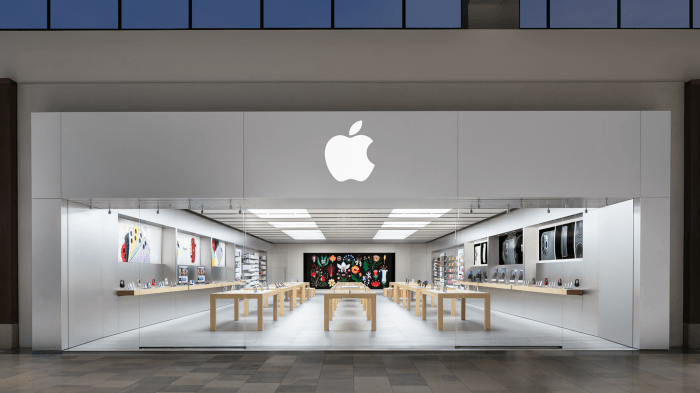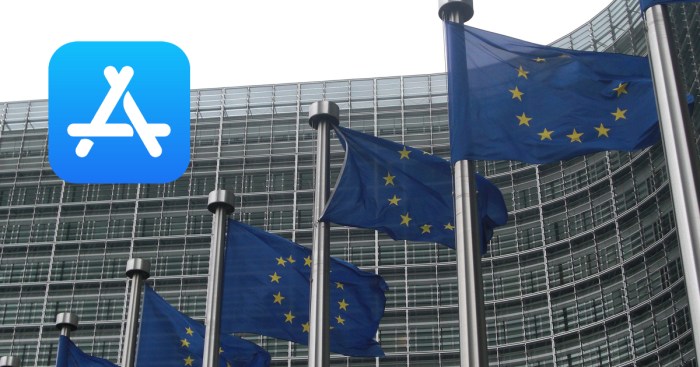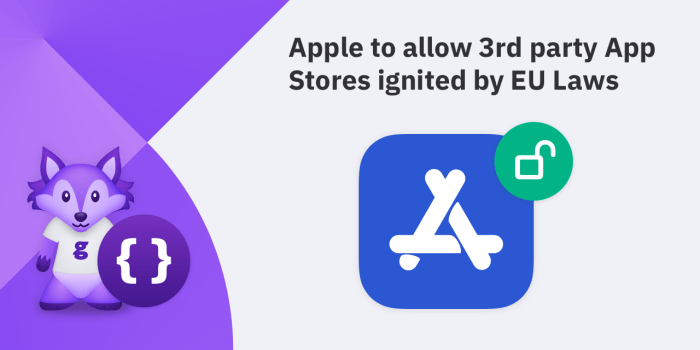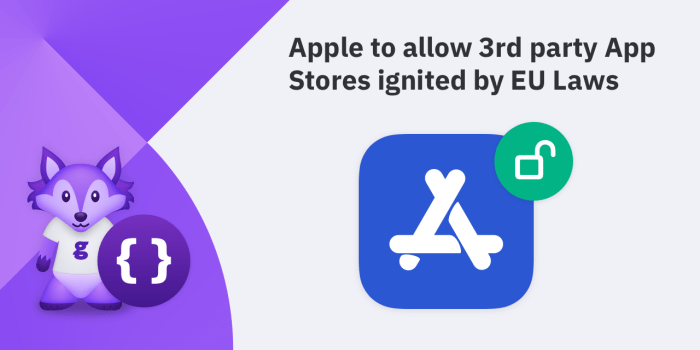App developers EU vs Apple debate third party app stores: The battle lines are drawn, and the stakes are high. The European Union (EU) has taken on Apple, challenging its strict control over the App Store and demanding the opening of the ecosystem to third-party app stores.
This landmark decision could revolutionize how apps are developed, distributed, and consumed, with potential ramifications for app developers, users, and the tech giant itself.
The EU’s antitrust case against Apple stems from concerns about Apple’s monopolistic practices and their impact on competition. The EU argues that Apple’s strict App Store policies, including a 30% commission on in-app purchases, stifle innovation and limit consumer choice.
They aim to level the playing field by allowing third-party app stores to compete, potentially offering lower fees and greater freedom for app developers.
The EU’s Antitrust Case Against Apple

The European Union (EU) has launched a significant antitrust case against Apple, focusing on the company’s App Store policies. The EU’s concerns center around Apple’s control over the App Store, which they argue stifles competition and harms developers and consumers.
The EU’s Antitrust Concerns
The EU’s investigation has identified several key antitrust concerns related to Apple’s App Store policies:
- Anti-competitive restrictions on app distribution:The EU alleges that Apple’s requirement for developers to use its in-app purchase system, with its 30% commission, restricts competition and prevents developers from offering alternative payment methods. This practice, according to the EU, creates a barrier to entry for new app developers and hinders innovation.
- Restrictions on app promotion and discoverability:The EU claims that Apple’s policies regarding app promotion and discoverability within the App Store give Apple an unfair advantage and limit the ability of smaller developers to compete. This includes allegations that Apple prioritizes its own apps and services in search results, limiting visibility for other developers.
- Data collection and privacy concerns:The EU also expressed concerns about Apple’s data collection practices, which they argue could be used to give Apple an unfair advantage in the market.
The EU’s Legal Arguments
The EU’s legal arguments are rooted in the EU’s competition laws, particularly Article 102 of the Treaty on the Functioning of the European Union (TFEU), which prohibits abuse of a dominant market position.
The EU argues that Apple’s App Store policies create a dominant market position for the company, enabling it to impose unfair restrictions on developers and consumers.
The EU’s legal team has pointed to evidence suggesting that Apple’s practices stifle competition, restrict consumer choice, and limit innovation within the mobile app ecosystem.
The EU’s Proposed Remedies
To address these concerns, the EU has proposed several remedies, including:
- Allowing alternative payment methods:The EU demands that Apple allow developers to use alternative payment methods within their apps, giving consumers more choice and potentially lowering transaction costs.
- Increased transparency and fairness in app promotion:The EU proposes that Apple be more transparent in its app ranking algorithms and provide equal opportunities for app promotion, ensuring a level playing field for all developers.
- Data privacy and security safeguards:The EU seeks stricter regulations on Apple’s data collection practices, ensuring user privacy and data security.
The Rise of Third-Party App Stores in Europe

The European Union’s landmark decision to force Apple to open up its iOS ecosystem to third-party app stores has created a ripple effect across the tech landscape. This move has paved the way for a new era of competition in the app distribution market, with a burgeoning ecosystem of third-party app stores emerging in Europe.
The Current Landscape of Third-Party App Stores in Europe
The European market is now witnessing a surge in the number of third-party app stores, offering developers and users alternative distribution channels. These stores are not only vying for a share of the lucrative app market but also seeking to challenge Apple’s dominance and offer greater flexibility and control to developers and users.
Key Players and Their Strategies
Several key players are shaping the landscape of third-party app stores in Europe:
- Amazon Appstore:Amazon, a major player in e-commerce and cloud computing, has already established a presence in the app store market. Its strategy is to leverage its existing user base and infrastructure to offer developers a wider audience and a more competitive revenue share.
- F-Droid:F-Droid is a non-profit organization that promotes open-source software and offers a repository of free and open-source apps. It has gained traction among users who prioritize privacy and security. Its strategy focuses on fostering a community of developers and users committed to open-source principles.
- Other Emerging Players:Several other startups and smaller companies are emerging in the European market, offering specialized app stores tailored to specific niches or regions. These players are focusing on providing unique features, lower fees, or greater transparency to attract developers and users.
Understand how the union of take a look at vendor tech from eurobike in frankfurt can improve efficiency and productivity.
Potential Benefits of Third-Party App Stores, App developers eu vs apple debate third party app stores
The rise of third-party app stores presents several potential benefits for developers and users:
- Increased Competition:The presence of multiple app stores can lead to greater competition, potentially driving down app prices and increasing the quality of apps. Developers can benefit from increased visibility and reach.
- More Choices for Users:Users gain access to a wider range of apps, including those that might not be available on the App Store. This increased choice can lead to a more vibrant and diverse app ecosystem.
- Greater Flexibility for Developers:Developers can enjoy greater flexibility in terms of pricing, distribution, and monetization models. They can choose to distribute their apps through multiple stores or explore alternative revenue streams.
- Reduced App Store Fees:Some third-party app stores offer lower fees than Apple’s App Store, which can be a significant advantage for developers, especially for smaller studios or independent developers.
Challenges of Third-Party App Stores
While the potential benefits are significant, there are also challenges associated with the rise of third-party app stores:
- Fragmentation:The proliferation of app stores can lead to fragmentation, making it difficult for developers to reach a large audience. Users may need to install multiple app stores to access the full range of available apps.
- Security Concerns:Third-party app stores may have less stringent security measures than Apple’s App Store, potentially increasing the risk of malware or other security threats. Users need to be cautious about the apps they download from these stores.
- Discovery and Promotion:Apps on third-party stores may struggle with discoverability and promotion, as they may not have the same reach or marketing resources as the App Store.
- Compliance and Regulations:Third-party app stores need to comply with local regulations and privacy laws, which can be complex and challenging.
The Impact on App Developers
The EU’s decision to force Apple to allow third-party app stores could significantly impact app developers, creating both opportunities and challenges. This shift in the app ecosystem could influence how developers generate revenue, reach their target audience, and ultimately, compete in the market.
Potential Impact on App Developers’ Revenue Models
The introduction of third-party app stores could diversify revenue models for app developers. Currently, Apple’s App Store takes a 30% commission on all in-app purchases, which can significantly reduce developers’ profits. Third-party stores may offer more favorable commission rates, potentially leading to increased revenue for developers.
However, the impact on revenue models is not entirely straightforward. Developers might face challenges in managing multiple app stores, potentially increasing administrative costs. Furthermore, the fragmentation of the app market could lead to lower app downloads and potentially lower revenue, as users may be spread across different app stores.
Apple’s Perspective

Apple has vehemently opposed the EU’s intervention, arguing that it undermines the security and privacy of its users and could lead to a fragmented app ecosystem. Apple maintains that its strict control over the App Store is essential to protect users from malicious apps, ensure app quality, and maintain a consistent user experience.
Apple’s Concerns About Security and Privacy
Apple argues that allowing third-party app stores could compromise the security and privacy of its users. The company emphasizes that its App Store review process is designed to catch malicious apps and protect user data. Opening up the ecosystem to third-party stores, according to Apple, would create vulnerabilities that could be exploited by developers with malicious intent.
“Allowing third-party app stores would create a fragmented app ecosystem, making it harder for users to find and trust apps.”
Apple
Apple’s Efforts to Maintain Control Over Its App Store Ecosystem
Apple has taken several steps to maintain control over its App Store ecosystem, including:* Strict App Review Process:Apple reviews every app submitted to the App Store to ensure it meets its quality and security standards.
App Store Guidelines
Apple has established strict guidelines that developers must adhere to when creating and distributing apps on the App Store. These guidelines cover various aspects, including privacy, security, and content.
In-App Purchase System
Apple’s in-app purchase system ensures that users can purchase digital goods and services within apps securely and transparently. This system also allows Apple to collect a commission on these transactions.
Apple Pay Integration
Apple Pay integration allows users to make secure and convenient payments within apps. This feature is only available on the App Store, further strengthening Apple’s control over the ecosystem.
The Future of App Distribution: App Developers Eu Vs Apple Debate Third Party App Stores
The EU’s landmark decision to force Apple to open up its App Store to third-party app stores could have a profound and lasting impact on the app economy. This shift opens up a new era of competition, potentially leading to a more diverse and dynamic app ecosystem.
However, the implications extend beyond the immediate impact on developers and users, raising questions about the future of app distribution, innovation, and even user privacy and security.
The Potential for Innovation and Competition
The rise of third-party app stores in Europe could ignite a wave of innovation in the app market. With more players vying for developer attention and user loyalty, there’s a greater incentive to offer competitive features and services. This could lead to:
- Lower app prices:Competition could drive down app prices, making apps more accessible to a wider audience.
- New app discovery methods:Third-party app stores might offer more innovative ways to discover and browse apps, potentially leading to the emergence of hidden gems.
- Greater developer freedom:Developers could have more freedom to choose where to distribute their apps, potentially leading to new business models and creative approaches to app development.
The increased competition could also benefit users by providing more choices and potentially leading to:
- More app options:Users could have access to a wider range of apps, including those that may have been previously blocked by Apple’s App Store guidelines.
- Improved app quality:Competition could incentivize app developers to improve the quality and features of their apps to stand out in a more crowded market.
- Enhanced user experience:With more options available, users could potentially find apps that better meet their specific needs and preferences.





